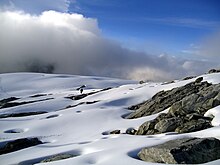

Alejandra Melfo
| |
|---|---|
| Born | (1965-02-26) 26 February 1965 (age 59) |
| Nationality | Venezuelan Uruguayan |
| Alma mater | Universidad de Los Andes International School for Advanced Studies |
| Occupation(s) | Physicist, Microbiologist |
| Employer | Universidad de Los Andes (Venezuela) |
Alejandra Melfo (born 26 February 1965) is a Uruguayan-born Venezuelan physicist. She is known for her efforts studying and conserving glaciers, especially the Humboldt Corona, the last glacier in Venezuela.
Melfo was born in Montevideo, the Uruguayan capital, and moved to Venezuela with her family in 1976 as refugees from dictatorship when she was 11.[1] She later became a naturalized Venezuelan citizen.[2] She studied at the University of the Andes (ULA) in Mérida and received her undergraduate degree in 1989, her master's degree in 1994, and became a faculty member at ULA whilst studying for a PhD in astrophysics at the International School for Advanced Studies (SISSA) in Trieste, Italy.[1][2]

At the University of the Andes, Melfo has worked in the Department of Physics and as director of the Center for Fundamental Physics. She has contributed to more than twenty scientific publications since the early 1990s.[2]
Originally working on supersymmetric theory,[1] her work later became focused on deterioration of glaciers, specifically La Corona, the last glacier in Venezuela,[3][4] after being introduced to the research of Andrés Yarzábal, a microbiologist at the University of the Andes.[1] Melfo is the leader of a group of scientists who are dedicated to studying the disappearance of ice forms due to climate change.[5]
She has also undertaken field work while researching glaciers, fronting an expedition to the Pico Bolívar glacier. She undertook training in climbing for months before traveling to the glacier, which has since melted completely. This is one of two expeditions from which 600 largely previously unknown microbial strains were recovered to be studied at the university, where they are preserved in deep freezers.[1]
Melfo officially retired in 2016, but has continued to work through Venezuela's crisis as other academics, including the majority of her Vida Glacial project team, leave. The remaining scientists face difficulties with their work, primarily with keeping the samples frozen amid blackouts.[1] Though Melfo is disturbed by the disappearance of the glaciers, she knows that with samples collected research can continue for a long time,[1] and also believes that new ecosystems developing on the site of former glaciers will be "beautiful to see".[6] She has also called the disappearance of glaciers a reminder of humanity's responsibility to look after the planet and to attempt to slow down climate change.[6]
She worked with her cousin,[7] the Uruguayan musician Jorge Drexler, to write the song "Despedir a los glaciares", which is included on the 2017 album Salavidas de hielo and is about the disappearance of the glaciers and the problems that cause it.[8][9] Also in 2017, she was one of the jury deciding the recipients of the Lorenzo Mendoza Fleury Science Prize.[10]
In 2019 Melfo and biology students of the University of the Andes began working with the GLORIA-Andes Project, focusing on the effects of climate change on biodiversity from high-altitude climates. They again face problems being unable to use computers for notes due to a lack of printing ink, and relying on second-hand or donated climbing gear that they store in a CLAP box.[1]
Melfo disagrees with the Maduro administration. She wrote a famous 2014 letter to Drexler that was widely published in Uruguay, where she explains her feelings towards the crisis in Venezuela, especially the tupamaros of Mérida, and her personal reasons for participating in the 2014 Venezuelan protests.[7]
| Authority control databases: Academics |
|
|---|